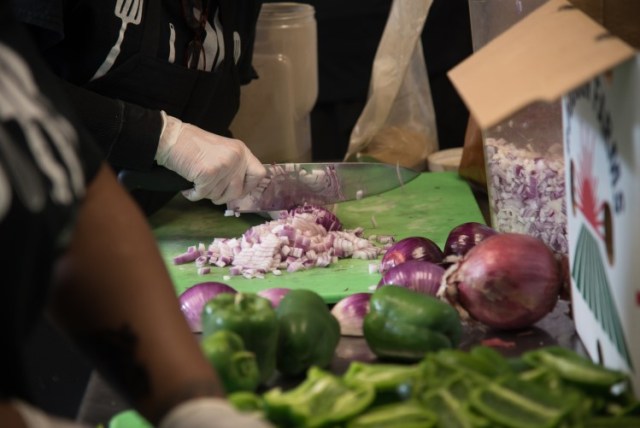By Cristina Rouvalis
The job offers come in every day to Community Kitchen Pittsburgh. It’s a place of second chances, where learning how to chop vegetables and slice meat can help erase the stigma of time behind bars.
Located at 107 Flowers Ave. in Hazelwood, the industrial kitchen with bright yellow walls offers culinary training to people who have endured incarceration, homelessness and other hardships.
After a year and a half hiatus due to the pandemic, the organization’s first full, in-person class resumed in August. Given the labor shortage in the hospitality industry, the timing couldn’t be better.
“People in our workforce development program are getting jobs before they complete the program. It’s crazy,” says Jennifer Flanagan, founder and executive director of the nonprofit. “They are offered signing bonuses, benefits after three months. It’s a totally different market right now. It’s hard on employees, but on the flip side, it’s great for our folks. They are making sustainable wages and benefits. Everyone is going to have a job before they graduate.”
The average starting wage for people coming out of the program has jumped from $15.31 an hour to $17.41 in the past year, Flanagan says.
That’s good news for Gregory Sayles, one of 18 people who is getting paid while learning the ropes of the kitchen under professional chefs. On a recent day, he was helping with “packaging and production,” or preparing school lunches for distribution.
After spending 15 years in a federal prison on drug charges and then losing a job in the steel mill during the pandemic, Sayles, 48, is grateful for the opportunity to learn new skills.
Thinking back to his youth, he says, “I was just a follower, young and stupid and trying to be a part of something that was really nothing. I made the worst mistake I could ever make in my life, and I paid dearly for it. But I am learning.”
Despite the stigma of a record, he says, “Everyone deserves a chance to prove themselves.”

Sayles is working under the supervision of Johnny Spicer, 54, a graduate of the program who was hired to train and supervise incoming students. “I’m doing what I’m supposed to be doing right now, helping other students who come from jail. It’s like a family to me. I am trying to show them the right way. If I did it, they can do it too.”
While checking the criminal record box on a job application is a deal-breaker in most fields, the food industry traditionally has been more accepting of people who have been incarcerated.
“It’s absolutely more forgiving,” Flanagan says. “It’s a place where you don’t need an advanced degree, and you can work your way up.”
Flanagan started the nonprofit in 2013 after leaving her job in the publishing industry in New York City. After 9-11, she wanted a new career that would let her give back. Community Kitchen Pittsburgh is part of a national system of learning facilities called Catalyst Kitchens.
She recently made the program even more accessible by paying transitional employment participants between $12 to $14 an hour, so they can leave jobs to train for a new career. Students also receive bus passes, uniforms and meals. Participants who wish to enroll can choose from various tracks, including new butcher and master baker tracks, to gain more employable skills and job opportunities.
The people who are often dismissed by society are the ones she finds most inspiring.
“If someone has been in prison for 15 years, they are ready to change their lives,” says Flanagan.
Cristina Rouvalis is a freelance writer whose work has appeared in national magazines including Hemispheres, PARADE, Esquire.com, AARP the Magazine, Fortune.com, Inc., and Parents.

